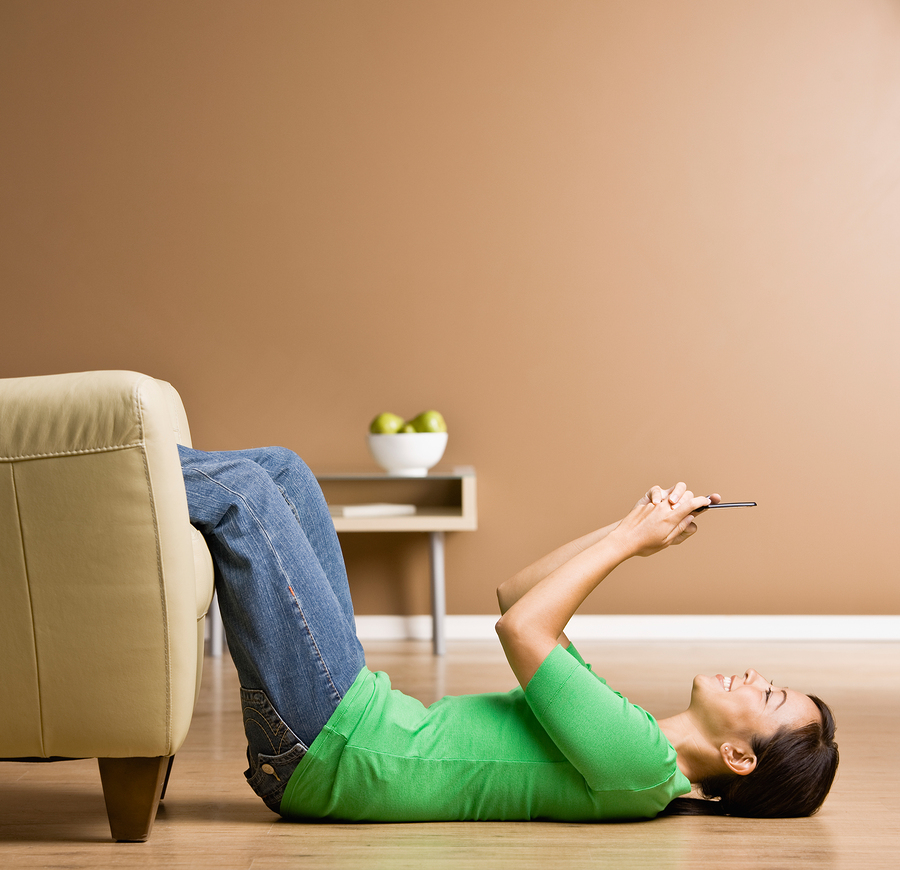 Do you become anxious when you briefly misplace your smartphone?
Do you become anxious when you briefly misplace your smartphone?
Do you feel nervous when circumstances (driving, social rules of engagement, etc.) cause you not to be able to check your smartphone for social media updates and messages?
If you answered yes to these questions, you are not alone.
In her article last week, CNN writer Sandee LaMotte explained: ‘"NO MObile PHOne phoBIA" is a 21st-century term for the fear of not being able to use your cell phone or other smart device.”
Mental health researchers and professionals credit the first mention of the term nomophobia to a 2008 survey on the topic by a research company in the United Kingdom. Since then, however, a variety of studies and evaluations continue to take place worldwide, providing statistics and recommendations to avoid or overcome the condition.
But is nomophobia a true disorder? Opinions about its legitimacy as a mental health malady do not agree. According to John M. Grohol, author, researcher, and founder of PsychCentral.com, discussions of smartphone addictions, as suggested by the term nomophobia, can lead to hyperbole or extreme exaggeration.
Grohol says concern over society’s fixation with technology actually began back in the 1960s when television became mainstream, and in the 1970s with the introduction and excitement over video games.
“Researchers still disagree over whether it’s appropriate to use the term “addiction” to describe behavioral compulsions or problems,” wrote Grohol in 2015. “The DSM-5--the diagnostic manual for mental disorders--still lists only a single behavioral compulsion in this category--compulsive gambling. There is no other ‘behavioral addiction’ that can technically be diagnosed today (not even “smartphone addiction”).”
In May 2014, researchers Nicola Luigi Bragazzi and Giovanni Del Puente tried in vain to propose a case for the inclusion of nomophobia in the DSM-5 prior to its publication. “The Diagnostic and Statistical Manual of Mental Disorders (DSM) is considered to be the gold standard manual for assessing the psychiatric diseases,” they explained.
“According to the DSM, a specific phobia is an anxiety disorder that represents unreasonable and irrational fear prompted by a specific stimulus (an object or a situation).” Bragazzi and Del Puente attempted to illustrate the correlation between nomophobia—the condition they consider an anxiety disorder--and the fears prompted by the ‘specific stimulus’—in this case, by the smartphone--or inability to find/use it.
Although their efforts were unsuccessful, the two remain optimistic. “Even though nomophobia has not been included in the DSM-V, much more attention is paid to the psychopathological effects of the new media [smartphones], and the interest in this topic will increase in the near future.”
Following Bragazzi’s and Del Puente’s rejected 2014 proposal, additional recognition has been given to nomophobia by scientists and analysts who believe it is a disorder that can be diagnosed and treated. In her CNN article, Sandee LaMotte described one such experiment in which a group of researchers from Seoul’s Korea University compared the brain imaging of 19 students “who were diagnosed with internet or smartphone addiction. . . with 19 teenagers who were not addicted”.
The imaging differences, wrote LaMotte, provided visual proof that smartphone addiction can change the human. The Korea University researchers concluded, “the brains of the addicted boys had significantly higher levels of GABA, a neurotransmitter in the cortex that inhibits neurons”. Slower neurons, they explained, result in reduced attention spans and less ability to focus.
In the same CNN article, LaMotte quotes Stanford neuroradiologist Dr. Max Wintermark, who commented on the Korean results. "It's a very small study, so you have to take it with a grain of salt," he said.
From small studies to individual accounts, acknowledgment of the prevalence of nomophobia continues. After experiencing sudden, tremendous anxiety when his smartphone was not in his pants back pocket, Piercarlo Valdesolo, Assistant Professor of Psychology at Claremont McKenna College in California, felt compelled to write. His 2015 article appeared in Scientific American.
Chastising his own reaction to the missing cell phone, Valdesolo wrote, “My dependence on devices reached an embarrassing low . . . [but revealed] two important aspects of what new research has called ‘nomophobia’.” Valdesolo refers to the I don’t know where my phone is! anxiety and the I’ll just get my phone to help me dependency.
Are you or someone you know suffering from nomophobia? Agreement on the condition may still be years away. In the meantime, the paradox of the smartphone is indisputable: it has both positive and negative effects on its users.
And while the discussion continues, scientists like Aarti Gupta, Psy.D., offer some self-care advice. The suggestions Gupta provides in her article for the Anxiety and Depression Association of America, on another 21st-century affliction, FOMO (Fear of Missing Out), are applicable to nomophobia discussions. She suggests:
- Admit you have a problem: Gupta suggests being honest with oneself, admitting the anxiety exists (in this case, surrounding one's dependence on the smartphone).
- Switch off the chatter: She proposes turning one’s phone off at night and not bringing it into the bedroom. In addition, Gupta discusses one CBT (cognitive-behavioral therapy) technique that “prescribes setting aside a certain time of day to check all your social media outlets. . . . Make this your one and only time of day to check your accounts.”
Finally, where significant technology dependency questions or concerns exist, contact professional mental health services for more information and assistance.
References
Bragazzi, N.L., & Del Puente, G., (May 16, 2014). U.S. Library of National Medicine—National Institutes of Health. A proposal for including nomophobia in the new DSM-V. https://www.ncbi.nlm.nih.gov/pmc/articles/PMC4036142/
Grohol, J.M., Psy.D., (July 14, 2015). PsychCentral.com. Is There a Pandemic of Smartphone Addiction? https://psychcentral.com/blog/archives/2015/07/14/is-there-a-pandemic-of-smartphone-addiction/
Gupta, A., Psy.D., (November 2017). Anxiety and Depression Association of America. Tips to Get Over Your FOMO, or Fear of Missing Out. https://adaa.org/learn-from-us/from-the-experts/blog-posts/consumer/tips-get-over-your-fomo-or-fear-missing-out
LaMotte, S., (December 1, 2017). CNN. Smartphone addiction could be changing your brain. http://www.cnn.com/2017/11/30/health/smartphone-addiction-study/index.html
Valdesolo, P., (October 27, 2015). Scientific American. Scientists Study Nomophobia—Fear of Being without a Mobile Phone. https://www.scientificamerican.com/article/scientists-study-nomophobia-mdash-fear-of-being-without-a-mobile-phone/